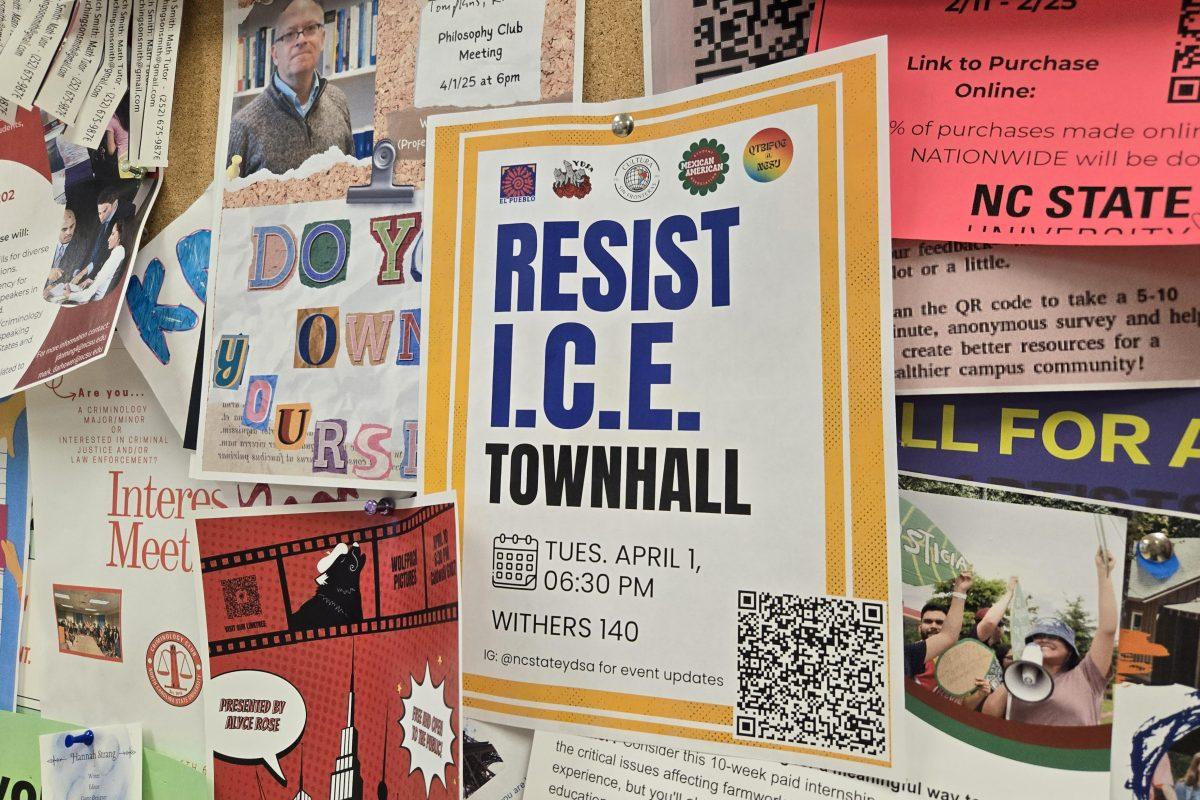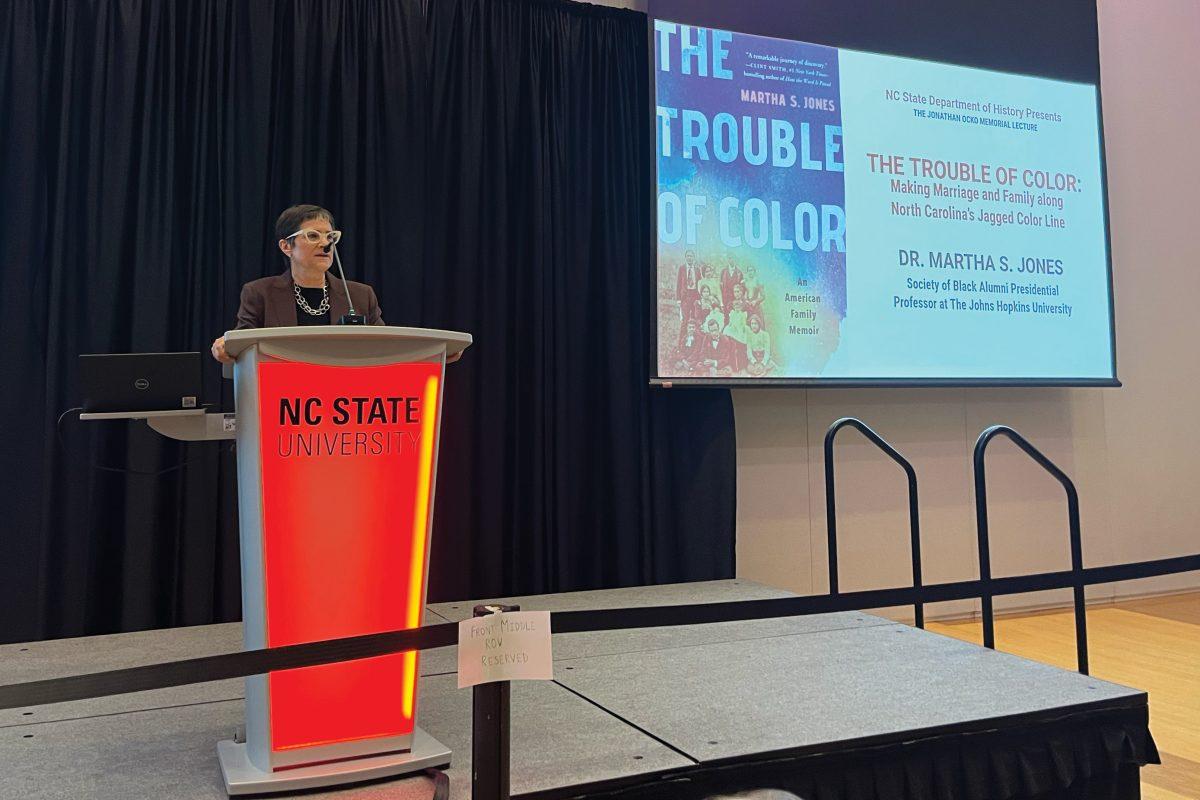Students and community members gathered on Tuesday evening for a “Resist ICE” town hall hosted by the NC State chapter of Young Democratic Socialists of America. The event, which focused on the impact of recent anti-immigration legislation in North Carolina, featured speakers from El Pueblo, a nonprofit advocating for immigrant rights, and Hoang Lam, an immigration attorney with NC State’s Student Legal Services.
One of the central topics discussed was House Bill 10, which became law in late 2024. The bill mandates that local law enforcement agencies cooperate with Immigration and Customs Enforcement, requiring officials to verify the immigration status of detained individuals and notify ICE within 48 hours. Helen Galeas, policy organizer at El Pueblo, said this law creates a “legal framework of immunity” for law enforcement officers who detain individuals based on minor infractions.
“You could potentially get pulled over because you did a rolling stop and you could say it wasn’t a rolling stop, and they’ll be like, yes, it was,” Galeas said. “And so now, not only are we potentially seeing that, now you don’t have a license, and then now sit to a bigger conversation of what’s your status.”
Galeas emphasized how such legislation criminalizes individuals based on their immigration status.
“That’s not a crime that somebody else would be judged for; however, again, because you’re being criminalized because of your status,” Galeas said.
Galeas highlighted additional bills currently under consideration in the North Carolina General Assembly. These include House Bill 318, which seeks to extend ICE’s 48-hour detainment window by starting the clock only after an individual is released from custody.
The town hall’s main bill of concern was Senate Bill 153, also known as the NC Border Protection Act. SB 153 mandates state agencies to cooperate with ICE under 287(g) agreements, prohibits UNC institutions from adopting sanctuary policies and audits state benefit programs to ensure they are not accessed by undocumented individuals. Galeas said this section of the bill is harmful to members of mixed-status families.
“This specific piece is redundant, but it’s also false, because we know that no one’s getting benefits, and if anything, we have mixed-status families — we have a lot of children, of US citizens, who are now not able to necessarily get the benefits that they need, because we have a concern that there will be an auditing [of their] parent,” Galeas said.
SB 153 also includes provisions targeting universities, barring institutions from restricting federal agencies’ access to student records. If passed, federal agencies could access university databases without student consent, potentially exposing undocumented students to deportation risks.
“Section four is meant to target students, and it’s meant to prevent you guys from being able to do much, but also intimidate,” Galeas said. “It’s supposed to intimidate, and again, it prevents officials, whether it’s the US, [or the] institution itself, to be able to do something about this.”
A key topic of discussion was the difference between judicial and administrative warrants. Judicial warrants are issued by a judge and authorize ICE to enter private spaces like homes or dorms. Administrative warrants, however, are signed by ICE officers and do not grant entry into private areas without consent.
“ICE can go where the public goes,” Lam said, noting that private areas such as dorm rooms, study rooms or some classrooms require judicial warrants for access.
Lam said students could lobby University administrators to post signage designating private areas on campus to prevent confusion during enforcement actions.
Lam said SB 153’s provisions place “anyone who is not a citizen at risk,” including green card holders who could face deportation if past immigration irregularities are uncovered. He cited cases like Mahmoud Khalil at Columbia University and Rumeysa Ozturk at Tufts University as examples of how individuals can be targeted for their political views under rarely invoked laws related to foreign policy implications.
Ozturk’s arrest last week drew national attention after she was detained by plainclothes ICE officers near her Massachusetts residence. Her visa was revoked following her criticism of U.S.-Israel relations in a student publication.
“Immigration law is actually civil law, so it’s not criminal law, so it doesn’t have to be a crime to get arrested and deported,” Lam said.
Lam said he urges students to be proactive in protecting themselves and utilizing NC State’s legal services. He said students can receive guidance on their own immigration status and situation, as well as help draft power of attorney documents for family members, which would ensure their legal representation if they were to be detained for their immigration status.
Nicole Lopez, youth coordinator at El Pueblo highlighted various forms of civic engagement students could undertake, including attending school board meetings, lobbying legislators, protesting and educating others about these issues.
“Civic engagement is basically community engagement,” Lopez said. “ … There are several different ways that you can engage in your community and advocate for the issues that you care about.”
Additionally, Lopez underscored the importance of preparation and mutual support within the community. She recommended that students familiarize themselves with their rights, particularly regarding interactions with ICE.
For more information on advocacy efforts or legal resources, students can contact El Pueblo or NC State’s Student Legal Services office.












